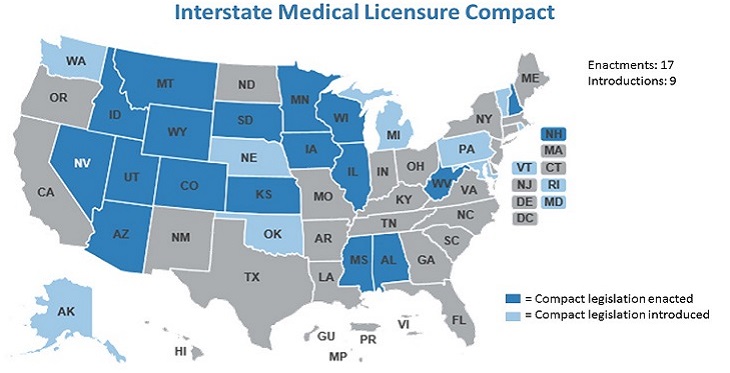Arizona is now one of 17 states to sign on to the Interstate Medical Licensure Compact, which provides an expedited licensing process for physicians interested in practicing in multiple states.
Another nine states have introduced legislation to join the Compact, which is expected to expand access to health care for people living in rural and underserved areas of the country, while facilitating the use of telemedicine in those areas.
The new law will help Arizona attract top-quality physicians to Arizona, by letting “the world’s most talented physicians know that Arizona is open for business,” said Gov. Doug Ducey, who signed Arizona House Bill 2502, approving the Compact, into law on May 11.
The Compact has been endorsed by multiple stakeholders, including the American Medical Association and the American Osteopathic Association.
“The Arizona Medical Board looks forward to working with the Interstate Medical Licensure Compact Commission to establish procedures to effectively administer the Compact to provide another pathway to expeditiously license physicians,” said Patricia McSorley, JD, executive director of the Arizona Medical Board, according to a press release from the Federation of State Medical Boards.
“We are delighted to become a participant in the Compact,” said Jenna Jones, CPM, executive director of the Arizona Board of Osteopathic Examiners in Medicine and Surgery, who also was quoted in the federation’s press release. “As the sixth largest state in the United States in square miles, Arizona has a diverse patient population, many of whom live in distant or rural locations. The Compact will be a valuable resource in ensuring they receive quality health care.”
Arizona was the 14th state to sign on to the Compact, followed by Kansas, Mississippi and Colorado. The other 13 states to enact Compact legislation are Alabama, Idaho, Illinois, Iowa, Minnesota, Montana, Nevada, New Hampshire, South Dakota, Utah, West Virginia, Wisconsin and Wyoming.
The nine states that have introduced Compact legislation are Alaska, Washington, Nebraska, Oklahoma, Michigan, Pennsylvania, Maryland, Rhode Island and Vermont.
On June 17, the U.S. Health Resources and Services Administration (HRSA) announced it will provide funding to state medical and osteopathic boards to assist them in implementing the Interstate Medical Licensure Compact.
Backers of the Compact in Arizona have emphasized it does not take any regulatory authority from the state. The Arizona Medical Practice Act will remain in place, and the state will oversee disciplinary actions.
From a convenience standpoint, the Compact promises to streamline the licensing process for physicians wanting to practice in multiple states, in part by reducing redundant licensing requirements across states.
According to the Compact’s website, http://www.licenseportability.org, expedited licensing is not yet available but will be soon.
In other Arizona legislative action relevant to telemedicine, Gov. Ducey signed Senate Bill 1363, expansion of the telemedicine parity law. SB 1363 follows SB 1353, enacted in 2013, which mandated insurance coverage for burn and trauma care, cardiology, infectious diseases, mental health disorders, stroke and other neurological disorders and dermatology. SB 1363 removes the geographic rural restriction and adds pulmonology to the list of health-care services that health insurers will be required to cover.
SB 1363 will go into effect on Jan. 1, 2018.

